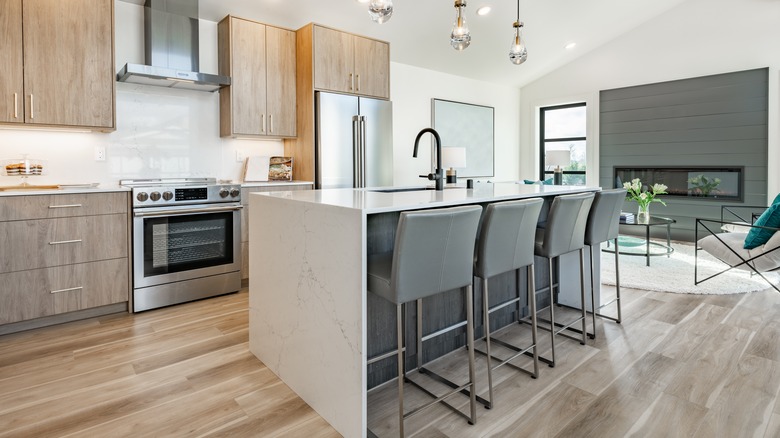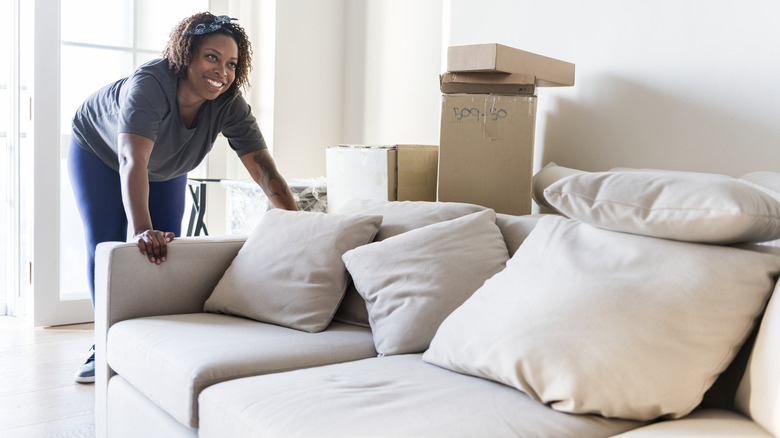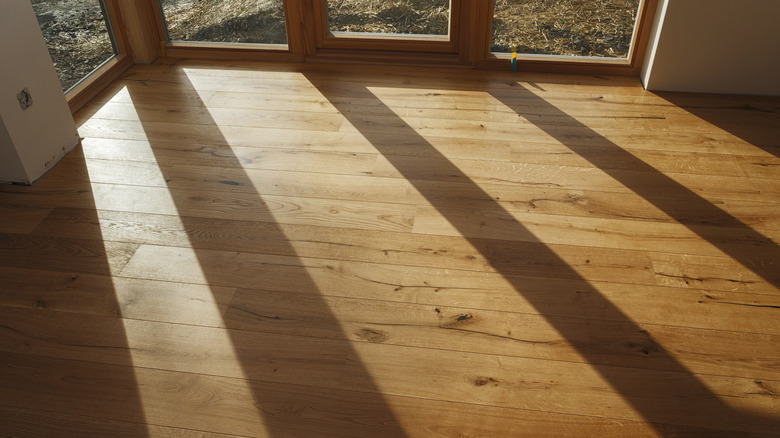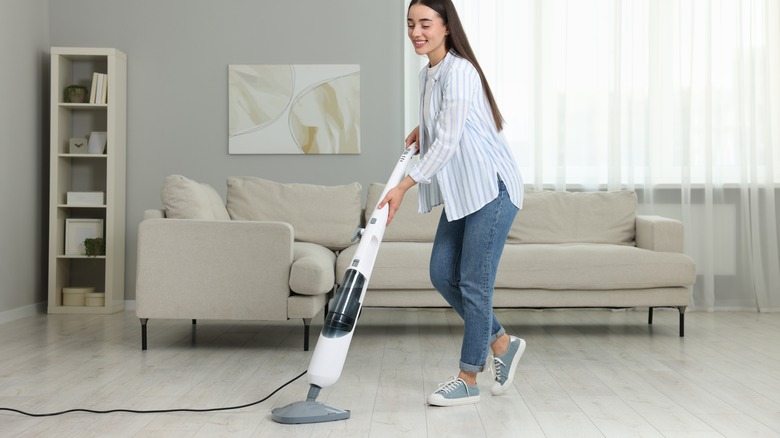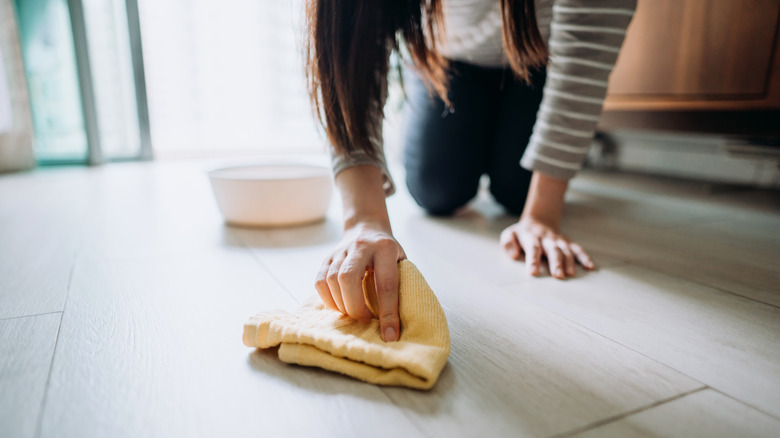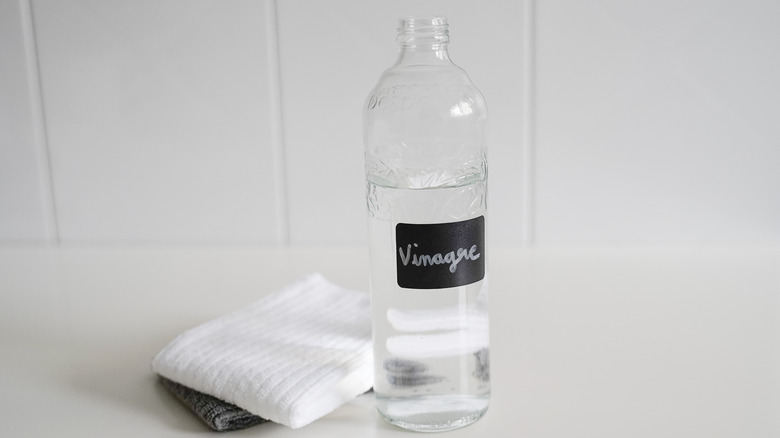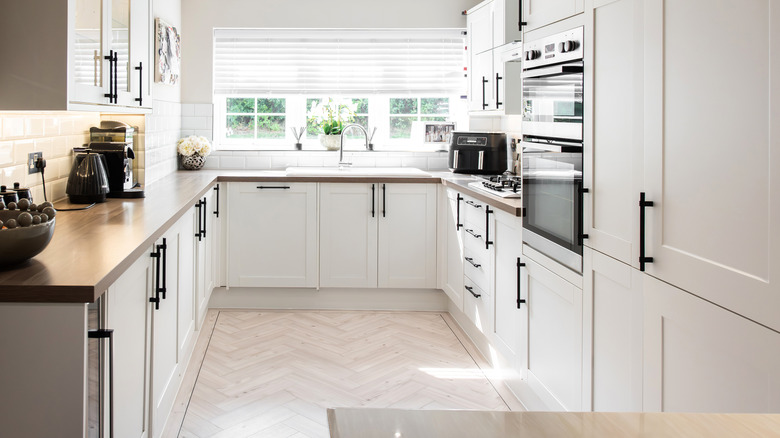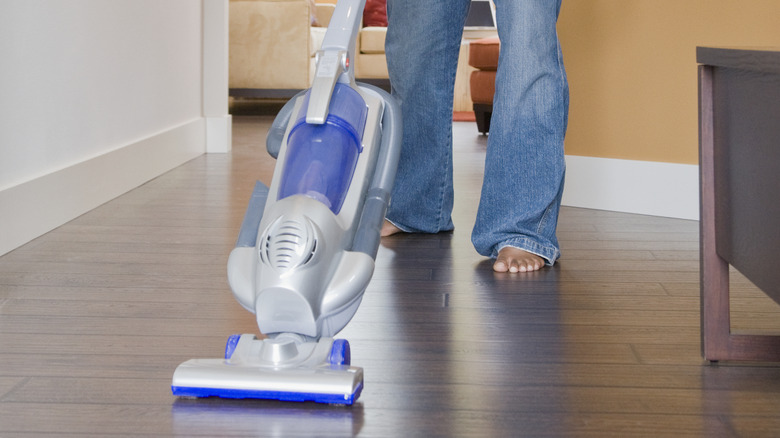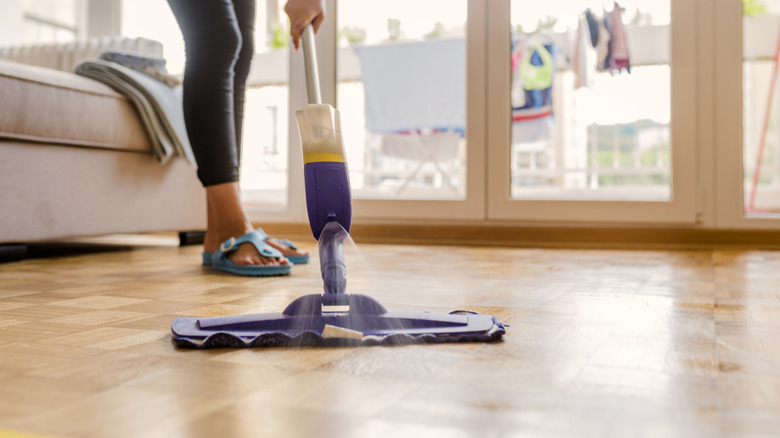7 Things You Should Never Do If You Have Vinyl Flooring
We may receive a commission on purchases made from links.
Whether you moved into a home with existing vinyl floors or just spent a lot of money to install new vinyl flooring, you want to do what you can to keep them looking their best. Unfortunately, several people inadvertently damage them in various ways, decreasing their lifespan or negatively impacting their aesthetic appeal. All because they don't know the proper way to care for and maintain them. While there are varying qualities of vinyl floors — including higher end options that are even more scratch-resistant than laminate — you still want to avoid any mishaps that might cause them damage.
When in doubt, you can always check with the manufacturer of your specific floors, but in the meantime, heed the tips we've shared below. To gather them, we spoke with flooring expert Darren, a Chicago-based remodeling and flooring contractor at ElmWood Flooring. These key takeaways will help you protect vinyl floors from damage, maintain their beautiful appearance, and ensure they add to — not detract from — the overall visual appeal of your home.
If you frequently swap out your furniture, don't place heavy furniture on your vinyl floors
Do you like constant change in your home? For example, do you like to shift your couch for a new view, or are you undecided about your dining table and will likely swap it out? If you're the type of person who likes to tinker with their aesthetic and constantly updates or moves their furniture, Darren recommends opting for lighter pieces if you have vinyl floors. He says, "A significant drawback of vinyl plank flooring, when compared to true hardwood, is that the surface is softer and it is more susceptible to dents from heavy items."
Darren explains that overly heavy appliances or furniture can place too much strain on the planks, potentially causing them damage. Heavier couches or dressers shouldn't be too problematic if you plan on leaving them in one location, though. They will likely cause dents, but they won't be noticeable until you pack up and move. However, if you like to shift your furniture around or swap them out for new pieces, it might be beneficial to invest in lighter options like pieces from IKEA. If that's not your vibe, then consider adding padding underneath to create some cushion between the piece and softer planks.
Don't expose your vinyl floors to too much sunlight
If you want to keep your vinyl floors looking fresh and fade-free, one thing you must not do is expose them to too much sunlight. "Sunlight exposure can fade and damage vinyl over time, as the UV rays in sunlight can break down the material, causing discoloration and even cracking, so it is not strong enough to withstand constant sunlight exposure," explains Darren.
He recommends ensuring your vinyl floors are shaded for most of the day. This can be especially true if you have darker vinyl floors, as Darren says that they fade more quickly than their lighter counterparts. So, if you have vinyl floors — or are planning on getting them installed soon — make sure you have window coverings, especially in rooms that get a lot of sun exposure. If you want to open the windows for fresh air, consider hanging some window shears that will still allow a cooling breeze to enter, but that will also provide some shade to protect the floors.
Avoid using a steam mop to clean vinyl floors
Steam mops are very handy devices that can help you clean various surfaces in your home. However, you shouldn't rely on them to clean your vinyl floors. These mops clean by generating heat and moisture, two elements that Darren explains can spell trouble for vinyl floors. "Specifically, the heat from a steam mop can cause vinyl to warp or peel, especially over time. Moisture from the steam can also seep into the seams of the vinyl, causing the planks to swell and potentially leading to mold and mildew," he says.
As if that wasn't bad enough, the hot steam can also interfere with the adhesive that was applied to keep the vinyl in place. As Darren notes, "the heat from the steam can soften the adhesive that holds the vinyl to the subfloor, causing it to shift or lift." Fortunately, these are all issues you can avoid if you put that steam mop aside and save it for safe surfaces, such as tile.
Steer clear of using abrasive cleaners on your vinyl floors
When you're looking for the easiest way to clean vinyl floors, it may be tempting to pull out an abrasive cleaner to get rid of a sticky mess. However, doing so would be a mistake. While you might be able to get rid of the sticky residue quickly, you're more likely to hurt the surface. According to Darren, "Abrasive cleaners can scratch the surface of vinyl floors, leaving them vulnerable to damage and marks."
So, what qualifies as an abrasive cleaner? These products range from things like scouring pads to powder and liquid abrasive cleaners, such as Comet or baking soda. The problem with abrasive cleaners is that they'll break right through the finish of the flooring. Once this protective finish is penetrated, you're more likely to see scratches or other blemishes — and they won't be easy to get rid of. However, this might not be an issue if you have higher quality vinyl that is extremely scratch resistant. Regardless, you shouldn't tempt fate by routinely applying course cleaners to it. After years of use, gritty sponges and powders can eventually wear down the protective layer and expose the flooring to damage.
Ammonia-based cleaners and vinegar are also not safe for vinyl floors
Unfortunately, the restrictions for cleaning vinyl floors don't stop with abrasive cleaners. There are other cleaning agents you should avoid using on vinyl floors, including ammonia or any ammonia-based cleaners. "Ammonia's high alkalinity can cause vinyl to become brittle, discolored, and cracked over time," shares Darren. Moreover, it will leave a residue behind on your floors. Your safest bet is just to avoid it entirely.
Vinegar can help keep many areas of your home clean, however, Darren recommends against using vinegar to clean vinyl floors. He explains that vinegar is "not pH balanced and may harm vinyl planks." Vinegar is very acidic, which can damage the surface of your floors. Not only will they lose their shine if you routinely clean them with vinegar, but they'll also start to darken over time with repeated use.
Don't use wax or solvent-based polishes on your vinyl floors
If you've previously had hardwood floors, then you may be used to applying wax to help maintain their finish. Therefore, you might assume that you should also apply wax to your vinyl floors. However, according to Darren, doing so would be a big mistake. "These can leave a film on vinyl floors and dull their shine over time," he cautions. It is also possible that the wax will effectively break down the coating over time, leaving your floors more susceptible to damage — the exact opposite of what you were trying to do.
Another reason to avoid using wax on vinyl floors is that they are already shiny, sealed, and protected against moisture. The coating that comes on the planks when you purchase them ensures that this is the case. Applying more wax won't offer further protection, and it may even make the surface slippery and unsafe.
Don't damage your floors using vacuum beater bar attachments
You can use a vacuum cleaner on vinyl floors. However, there is one vacuuming mistake that will cause damage to your vinyl plank floors. Never clean these surfaces using a vacuum cleaner with a beater bar attachment that you can't turn off or disable. As Darren points out, "These [attachments] can damage the surface of vinyl floors."
A vacuum beater bar is a part of the device that is designed to clean carpets. The rolling brush features bristles that rub against the carpet, pulling up hair, dirt, and other debris that are trapped in the fibers. However, this rotating and rubbing mechanism is likely to leave behind micro-abrasions on your vinyl floors, especially if it comes in contact with something like a small rock. While you might not see any wear using it for a few months, you'll notice your floors noticeably dingier after years of repeated use. You're putting more stress on the top layer, wearing it down faster than intended.
Some vacuums come with separate heads for cleaning hard floors or have a beater bar that you can disable. If neither of these is the case with your vacuum, then avoid using it to protect your vinyl floors against damage.
The best ways to clean your vinyl floors without damaging them
Now that you know what not to do if you have vinyl floors, you probably want to know what you should do to clean them without causing damage. Fortunately, there are still several safe options to choose from. One idea that Darren shares is to "use a soft-bristled broom or microfiber dust mop to remove dust, dirt, and debris." Consider trying the CLDREAM Microfiber Spray Mop. It comes with microfiber pads for wet mopping and chenille pads for dry mopping, offers a 360-degree rotating head, and features an ergonomic handle for easy steering.
Another cleaning option recommended by Darren is to "use a pH-neutral cleaner or a solution of water and a few drops of dish soap." Dawn Dishwashing Liquid Soap is known for its cleaning abilities and can help you safely, and effectively, remove grease and grime from your vinyl floors. Darren notes one more option: "A spin mop with a microfiber or nylon head is recommended because it's easy to wring out." Products like the O-Cedar EasyWring Microfiber Spin Mop enable you to clean with your favorite vinyl-floor safe cleaner. This model also features a 360-degree rotating head, a machine-washable mop head, and a telescoping handle.
